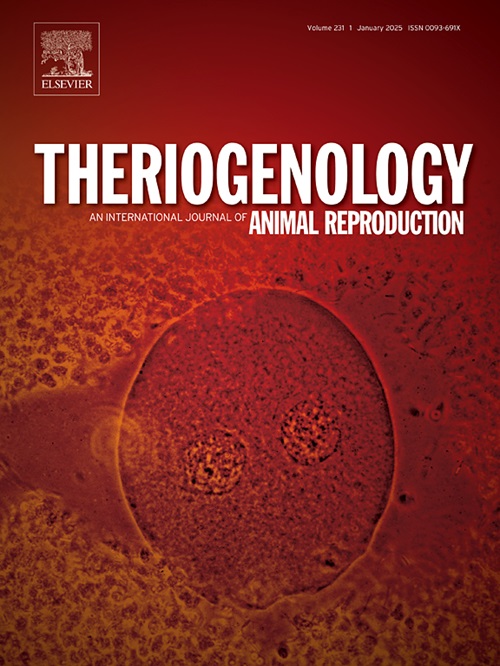Ovariectomy induces regression of hyperplastic uterus in female dogs
IF 2.5
2区 农林科学
Q3 REPRODUCTIVE BIOLOGY
引用次数: 0
Abstract
Cystic endometrial hyperplasia (CEH) is a common physiological affection in adult female dogs in diestrus, which can make the uterine environment susceptible to bacterial infections. It is known that hormonal interactions, mainly between progesterone and estrogen, are key players for development of the CEH-pyometra complex, but many questions remain regarding its etiopathogenesis. The present study proposes a new approach, to the authors' knowledge not yet described in literature, to add new information for better understanding of this affection and possibly establish new guidelines for obstetric surgery and reproduction in veterinary medicine. It is demonstrated that the absence of steroidal hormones leads to significant regression of uterine tissue and glandular hyperplasia, as well as reduction in estrogen and progesterone receptors and markers of tissue proliferation, in the uterus of female dogs, six months after ovariectomy. Significant involution of endometrial hyperplasia was observed, as the size and macroscopic appearance of the uterus. This study reaffirms the important role played by steroid hormones in demonstrating macroscopically, molecularly and histologically the regression of hyperplastic endometrial and glandular tissue when performing ovariectomy in female dogs. Our findings suggest that ovariectomy may induce regression of endometrial hyperplasia and could represent a potential alternative to ovariohysterectomy. However, larger studies including control groups are required to confirm these results and define the clinical applicability of this approach.
卵巢切除术诱导母犬增生性子宫消退
囊性子宫内膜增生(CEH)是成年母狗在妊娠期常见的生理影响,可使子宫环境易受细菌感染。众所周知,激素的相互作用,主要是孕激素和雌激素之间的相互作用,是ceh -脓膜复合体发展的关键因素,但其发病机制仍有许多问题。目前的研究提出了一种新的方法,据作者所知尚未在文献中描述,为更好地理解这种影响增加新的信息,并可能为兽医的产科手术和生殖建立新的指导方针。研究表明,雌性犬卵巢切除术后6个月,缺乏甾体激素导致子宫组织明显退化,腺体增生,雌激素和孕激素受体及组织增殖标志物减少。子宫内膜增生明显复旧,如子宫的大小和宏观外观。本研究重申了类固醇激素在宏观、分子和组织学上证明雌性犬卵巢切除术时增生子宫内膜和腺体组织消退的重要作用。我们的研究结果表明,卵巢切除术可能会导致子宫内膜增生的消退,并可能代表一个潜在的替代卵巢子宫切除术。然而,需要包括对照组在内的更大规模的研究来证实这些结果并确定该方法的临床适用性。
本文章由计算机程序翻译,如有差异,请以英文原文为准。
求助全文
约1分钟内获得全文
求助全文
来源期刊

Theriogenology
农林科学-生殖生物学
CiteScore
5.50
自引率
14.30%
发文量
387
审稿时长
72 days
期刊介绍:
Theriogenology provides an international forum for researchers, clinicians, and industry professionals in animal reproductive biology. This acclaimed journal publishes articles on a wide range of topics in reproductive and developmental biology, of domestic mammal, avian, and aquatic species as well as wild species which are the object of veterinary care in research or conservation programs.
 求助内容:
求助内容: 应助结果提醒方式:
应助结果提醒方式:


